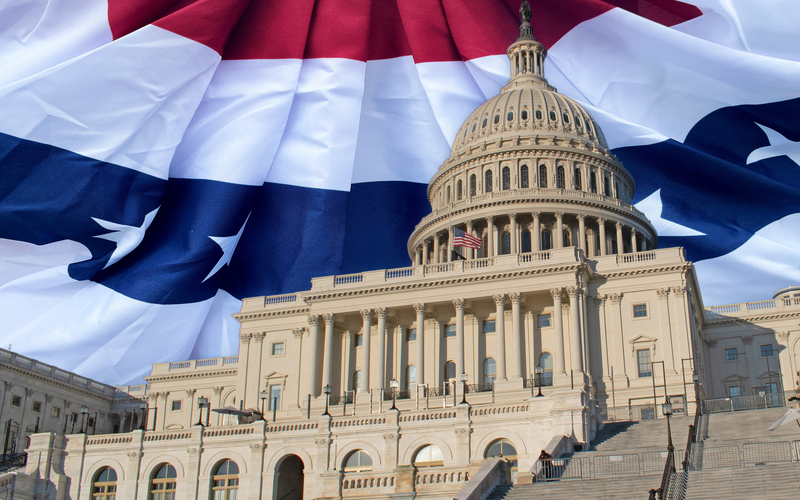Them Today, Us Tomorrow
Sign up for a six month free
trial of The Stand Magazine!
It’s not always only those who are directly affected by present troubles who take a stand and make change. It’s often those who know they are next.
John Hart, one of the little-known signers of the Declaration of Independence, is one of those.
Little is known about John Hart’s early years. Most historians put his birth somewhere between 1711 and 1713, in Stonington, Connecticut.
When Hart was around two years of age, his father moved their family to Hopewell, New Jersey, in order to build a family farm.
As a young boy, Hart spent time with his father working the fields. Though he had very little formal education, he spent much of his spare time studying and educating himself and eventually became well regarded for his common sense.
At 29, Hart married Deborah Scudder, and together they were blessed with 13 children.
As a young man, Hart began buying land and building a family farm of his own, eventually acquiring over 600 acres, making him the largest landowner in Hopewell.
His was a busy life, with his time spent raising his large family, helping neighbors, and working and improving his farm. All the while, he was also building a reputation among his community. He was seen as a man of good character and one who could be trusted to do what was right. He was so respected he earned the nickname “Honest John.”
As a result, in 1755, his neighbors elected him justice of the peace. They recognized that even with his position and a bit of power, Hart was still the same trustworthy and honest man; so in 1761 they elected him to be their representative in the New Jersey legislature.
In 1765, British Parliament imposed the infamous Stamp Act upon the colonists. The Stamp Act worked as a tax, requiring all printed material in the colonies to be printed only on paper bearing the royal stamp.
The tax itself was not overly burdensome as it was a small fee. In fact, Parliament made it a small fee on purpose, knowing that incrementalism works best, and people will generally yield a little at a time.
So, it wasn’t so much the tax the colonists had a problem with, but more so that they did not believe the king had the right to tax them – especially since they had no vote in the matter.
Hart was wise enough to foresee trouble. His desire was to live a simple life and enjoy his farm and family in peace.
He could have easily done so without major incident since the Stamp Act didn’t really affect him very much. Farmers used little to no paper that would require the royal stamp.
But he knew if other people’s freedom was being infringed upon, his would eventually be as well. So at great risk to himself and his family, and on behalf of others, he got involved.
The First Continental Congress met in 1774, and New Jersey chose John Hart to be their representative.
Hart, along with most of the other delegates didn’t want war with England; they simply wanted to be treated fairly. As a result, their first course of action was to send a letter to the king, seeking to rectify the situation peacefully.
The British, wanting to quell any sort of seeming rebellion, closed the port of Boston, prohibiting ships from bringing in goods. Their hope was to starve Massachusetts until they caved and ceded their rights. Massachusetts would not give in, and the other colonies stood in solidarity with them.
Hart would go home as much as he could to see to his farm, but under the circumstances, his fellow colonists continued to send him to Congress to represent them.
By June of 1776, he was elected as one of five New Jersey delegates to the Second Continental Congress with authorization to vote for independence, which by this time, he supported. Hart would become the thirteenth delegate to sign his name to the historic document we know as The Declaration of Independence.
Each signer understood the gravity of the closing line of the document that stated: “We mutually pledge to each other our Lives, our Fortunes and our sacred Honor.” They were aware of the potential cost and great sacrifice before them.
For Hart, it was a great sacrifice to represent his country. As mentioned earlier, he could have easily ignored the problems, going on enjoying his family and farm, and most likely, seen little consequence in his lifetime. But he could see the bigger picture.
Once the war began, Hart spent much of his time on the run, evading the British. He was a marked man, and the British had even published a notice stating that if Hart would only renounce his signature on the Declaration, he would be left alone. Hart refused.
On the run in the Sourland Mountains, Hart hid out in caves, thickets, and hollow logs, rarely sleeping in the same place for more than one night.
Once he received word that Washington had defeated the Hessians at Princeton in January of 1777, Hart was able to return home. Upon returning, however, he found his family had been scattered, and his farm had been devastated by the redcoats.
Hart died just two years later at the age of 66, not living long enough to see the end of the war and witness a free nation rise from the ashes.
His golden years could have been spent in leisure but were instead spent fighting for a cause he would never realize, one for which we would enjoy the benefits.
Today we find ourselves in a similar situation.
We have a federal government that has gained far too much power and is now seeking to impose their will on the citizenry.
Currently, it’s in the form of vaccine mandates.
Plenty of time has transpired and opportunity has been given, and those who want the shot have likely already gotten it.
For us pesky hold-outs who are “wearing thin” Mr. Biden’s patience, we have our reasons. For some of us, it’s religious. Some of us don’t trust the science because of the undeniable censorship of anyone who dares to go against the approved narrative. Some of us have already had COVID and believe our natural immunity is better than what the shot can offer. Some of us believe there are more effective treatments with less risk involved. Some of us just don’t trust the government (gasp).
And some of us, even though we are all for science, medicine, and vaccines, are just against a tyrannical regime telling us what we must do, or else.
Vaccinated or not, we must not lose sight of the bigger picture. It’s not really about the vaccine. It’s about incremental power grabs by the federal government, and forfeiture of freedoms by the people.
Today, it’s “take the vaccine or lose your job.” Tomorrow, it may be “take the vaccine or lose your tax rebates or refunds.” Next, it may be “take the vaccine or lose your insurance.” Then it may be “quarantine camps” for the unvaccinated.
Then, if the government ever moves past COVID, the next power grab will come in the form of battling “climate change.” There will be more burdensome policies and foolish mandates.
The insatiable desire for power and control is never satisfied. The more we cede, the more they will take. It’s just that simple.
What’s my point?
Those of us who are currently not being forced against our will to take a shot or not being threatened with losing our jobs must not forget about those who are.
I’m blessed to be employed by an organization that values freedom. Many are not so fortunate.
When we are not affected by what is currently going on, it’s easy to ignore the cries and desperation of others. That is such short-sighted thinking and fails to recognize that it’s them today, but us tomorrow.
I’m reminded of the words of the Lutheran pastor Martin Niemoller of Nazi Germany, who initially welcomed the Third Reich but then later opposed it.
Niemoller said,
“First they came for the socialists, and I did not speak out—because I was not a socialist. Then they came for the trade unionists, and I did not speak out— because I was not a trade unionist. Then they came for the Jews, and I did not speak out—because I was not a Jew. Then they came for me—and there was no one left to speak for me.”
Like John Hart, we need the foresight to see that we are heading in a dangerous direction.
We may not be affected now, but eventually, we will be. We must have the courage to speak up and fight for others, lest the day comes when no one is left to fight for us.
“Justice will not be served until those who are unaffected are as outraged as those who are.” - Benjamin Franklin.

Sign up for a free six-month trial of
The Stand Magazine!
Sign up for free to receive notable blogs delivered to your email weekly.



















